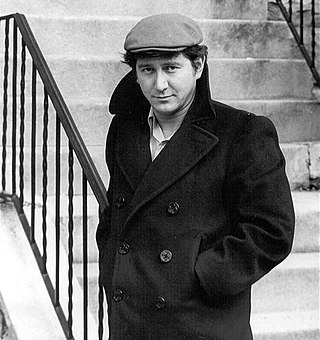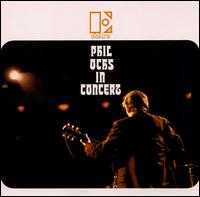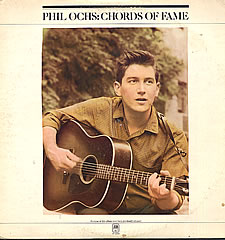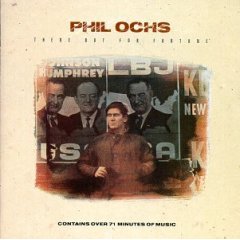Related Research Articles

Philip David Ochs was an American songwriter and protest singer. Ochs was known for his sharp wit, sardonic humor, political activism, often alliterative lyrics, and distinctive voice. He wrote hundreds of songs from the 1960s to early 1970s and released eight albums.

Joan Chandos Baez is an American singer, songwriter, musician, and activist. Her contemporary folk music often includes songs of protest and social justice. Baez has performed publicly for over 60 years, releasing more than 30 albums. Fluent in Spanish and English, she has also recorded songs in at least six other languages.

Phil Ochs in Concert is Phil Ochs' third long player, released in 1966 on Elektra Records. Despite its title, it was not entirely live, as several tracks were actually recorded in the studio, owing to flaws in the live recordings made in Boston and New York City in late 1965 and early 1966. The album's producers retained the essence of a live album by including song patter and audience reactions between and during the songs. Phil Ochs in Concert features many of the folksinger's most enduring songs and represents the culmination of Ochs' folk career, the last of his original albums to be all-acoustic.

Chords Of Fame is a two-LP compilation from American folk singer Phil Ochs, compiled by his brother Michael Ochs shortly after Phil's death and released in 1976 on A&M Records. With the exception of 1969's Rehearsals for Retirement, all studio albums are represented, as well as a number of live releases.

There but for Fortune was a 1989 compilation that summed up the three albums that Phil Ochs recorded for Elektra Records between 1964 and 1966. The album drew heavily from the third, presenting ten of its eleven tracks, and presenting six and five respectively from the first and second.
"Power and the Glory" is an American patriotic song by Phil Ochs, a U.S. protest singer from the 1960s known for being a harsh critic of the American military and industrial establishment. Originally released on his 1964 debut album, All the News That's Fit to Sing, "Power and the Glory" is said to have contributed to Ochs' profound impact.
"Outside of a Small Circle of Friends" is a song by Phil Ochs, a U.S. protest singer from the 1960s. "Outside of a Small Circle of Friends", which was originally released on Ochs' 1967 album Pleasures of the Harbor, became one of Ochs' most popular songs.
Jim R. Glover is an American peace activist and folk singer. He is from Cleveland, Ohio and lives in Brandon, Florida.

"I Ain't Marching Any More" is an anti-war song by Phil Ochs, a U.S. protest singer from the 1960s known for being a passionate critic of the American military industrial complex. Originally released on his 1965 album of the same name, "I Ain't Marching Any More" is one of Ochs's best-known songs.
"The War Is Over" is an anti-war song by Phil Ochs, an American protest singer in the 1960s and early 1970s. Ochs was famous for harshly criticizing the Vietnam War and the American military-industrial establishment. The song, which was originally released on Tape from California (1968), has been described as "one of the most potent antiwar songs of the 1960s".

The discography of Phil Ochs, a U.S. protest singer and songwriter, consists of seven studio albums, six live albums, six compilation albums, one box set, six other albums, and nine singles.
"Draft Dodger Rag" is a satirical anti-war song by Phil Ochs, a U.S. protest singer from the 1960s known for being a harsh critic of the American military industrial complex. Originally released on his 1965 album, I Ain't Marching Anymore, "Draft Dodger Rag" quickly became an anthem of the anti-Vietnam War movement.

Comment te dire adieu is the ninth studio album by French singer-songwriter Françoise Hardy, released in 1968 on Disques Vogue. Like many of her previous records, it was originally released without a title and came to be referred to, later on, by the name of its most popular song. The cover artwork was a drawing by Jean-Paul Goude.
"Crucifixion" is a 1966 song by Phil Ochs, a US singer-songwriter. Ochs described the song as "the greatest song I've ever written".
"Cross My Heart" is a 1966 song by Phil Ochs, an American singer-songwriter best known for the protest songs he wrote in the 1960s.

Phil Ochs: There but for Fortune is a documentary film on the life and times of folk singer-songwriter Phil Ochs. The film, released theatrically in January 2011, was written and directed by Kenneth Bowser. Its title is taken from one of Ochs' best known songs, "There but for Fortune" (1963).
"Love Me, I'm a Liberal" is a satirical song by Phil Ochs, an American singer-songwriter. Originally released on his 1966 live album, Phil Ochs in Concert, "Love Me, I'm a Liberal" was soon one of Ochs's most popular concert staples.

Françoise in Italian is a compilation album by the French popular singer Françoise Hardy where all songs are in Italian language. This compilation was only published in South Africa in 1970 under label World Record Co. It contains ten titles published in singles under Italian label Compagnia Generale del Disco, of 1968 to 1970.
References
- 1 2 3 Schumacher, Michael (1996). There But for Fortune: The Life of Phil Ochs . New York: Hyperion. p. 117. ISBN 0-7868-6084-7.
- ↑ Ochs, Phil (1964). Songs of Phil Ochs. New York: Appleseed Music. p. 9. OCLC 41480512.
- ↑ Eliot, Marc (1989) [1979]. Death of a Rebel: A Biography of Phil Ochs. New York: Franklin Watts. p. 85. ISBN 0-531-15111-5.
- 1 2 Phil Ochs interviewed on the Pop Chronicles (1969)
- ↑ Deming, Mark. "Phil Ochs: There But for Fortune". AllMusic . Retrieved August 27, 2016.
- ↑ Holden, Stephen (2011-01-04). "Aspiring to Musical Power and Glory". The New York Times : C6. Retrieved August 27, 2016.
- ↑ Cohen, David (1999). Phil Ochs: A Bio-Bibliography. Westport, Conn.: Greenwood Press. p. 206. ISBN 0-313-31029-7.
- ↑ Schumacher, There But for Fortune, pp. 113–117.
- ↑ Strong, Martin Charles (2002). The Great Rock Discography (6th ed.). Edinburgh: Canongate Books. p. 69. ISBN 1-84195-312-1.
- 1 2 Warner, Jay (2008). Notable Moments of Women in Music. Milwaukee, Wisc.: Hal Leonard. p. 133. ISBN 978-1-4234-2951-7.
- ↑ Taylor, Timothy Dean (1997). Global Pop: World Music, World Markets. New York: Routledge. p. 225. ISBN 0-415-91872-3.
- ↑ "Billboard singles". Billboard . Retrieved February 3, 2009.
- ↑ Schumacher, There But for Fortune, p. 95.
- ↑ "RPM Play Sheet - October 4, 1965" (PDF).
- ↑ Schomp, Virginia (2002). The Vietnam War. Tarrytown, N.Y.: Benchmark Books. p. 78. ISBN 0-7614-1099-6.
- ↑ Eliot, Death of a Rebel, p. 243.
- ↑ Schumacher, There But for Fortune, p. 305.
- ↑ "Françoise Hardy - Site Officiel - Discographie: Les albums - Françoise Hardy en anglais".
- ↑ Cohen, Phil Ochs, pp. 275, 277, 280, 282, 285–286, 291–292.
- ↑ Peter; Paul & Mary (1995). "There but for Fortune". Such Is Love. Google Play Music . Retrieved August 27, 2016.
- ↑ Fisher, Trent A. (May 27, 2002). "There but for Fortune" . Retrieved August 27, 2016.
- ↑ Cohen, Phil Ochs, p. 280.
- ↑ "Isabelle Boulay – Les Grands Espaces". Discogs . Retrieved August 27, 2016.